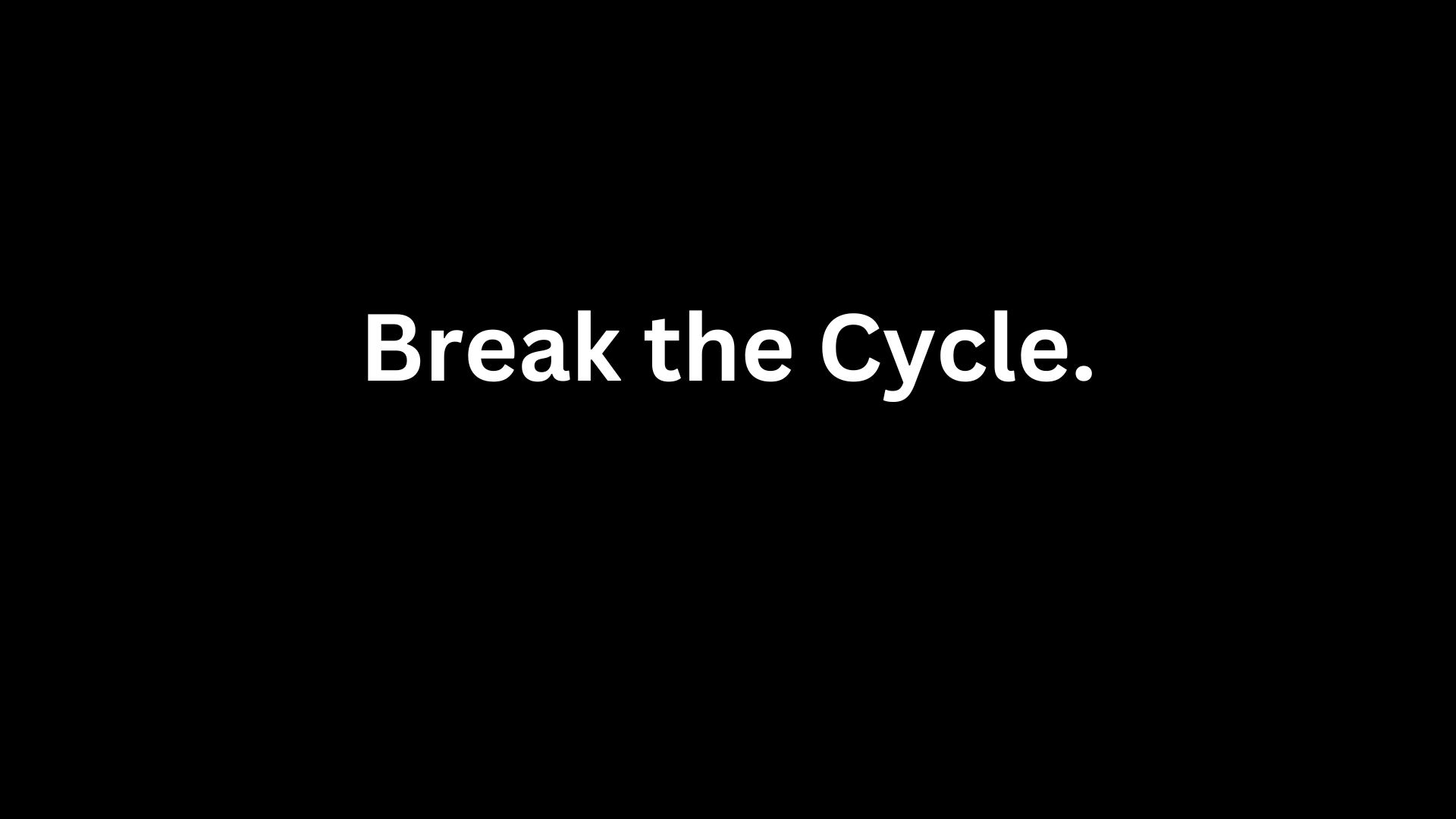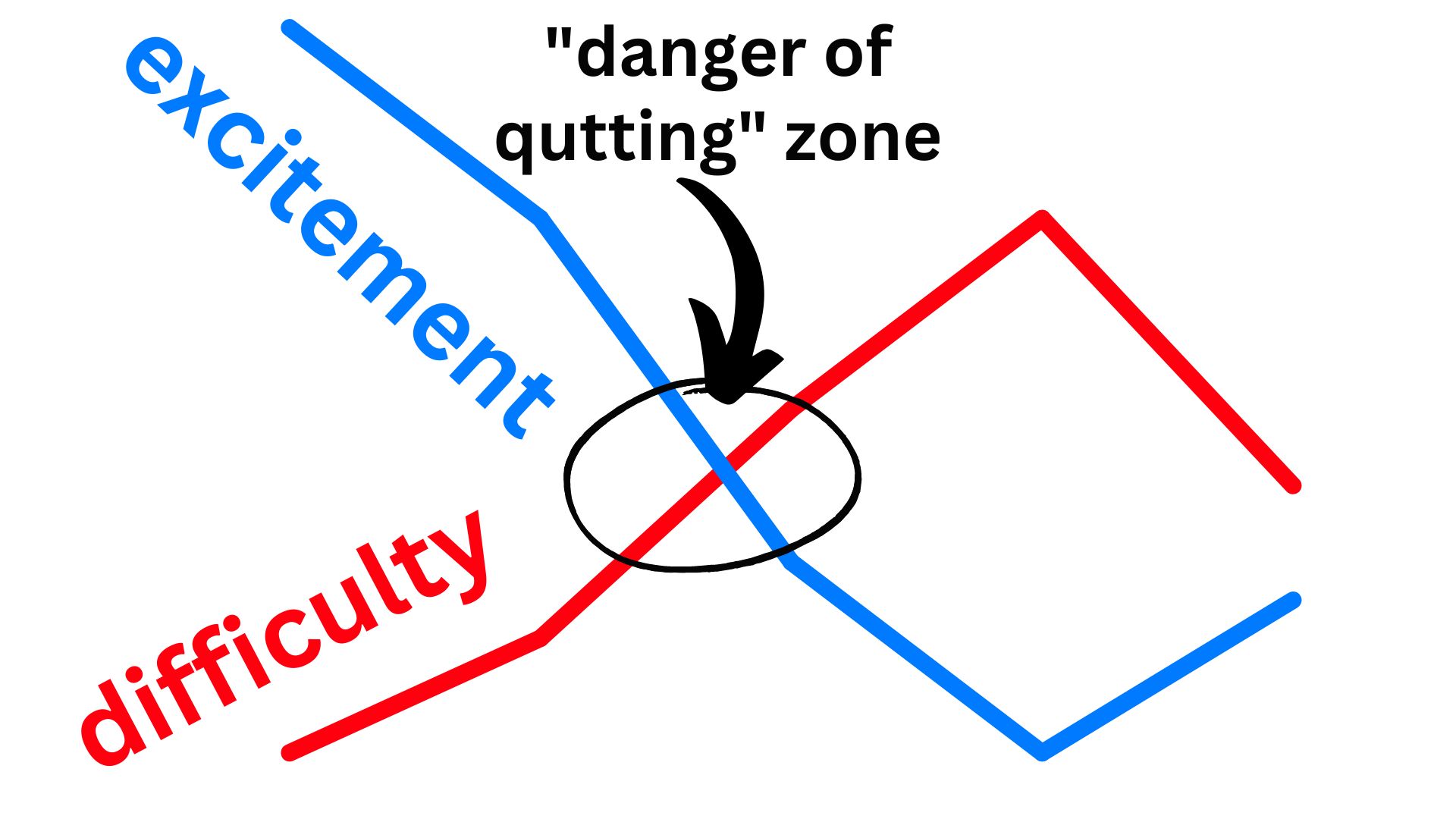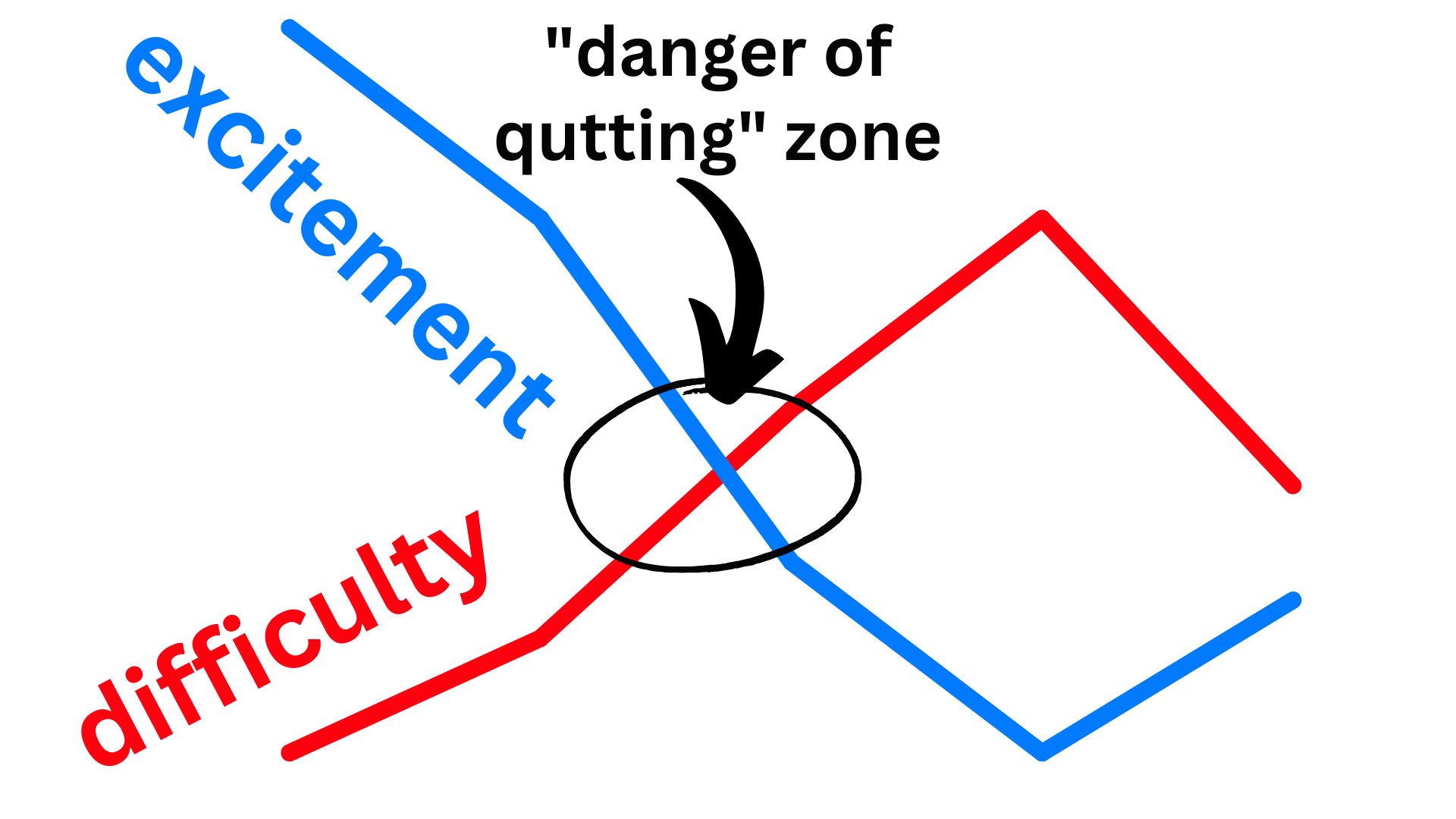Why You Keep Quitting What You Start (Break the Quitting Cycle)
Jul 20, 2023
I’ve published two (soon to be three) books, and some people find that impressive.
What I don’t tell them is that I have about 3-4 books that are dead on a Google Doc somewhere.
Projects that I gave up on entirely, after spending months working on them.
I’ve built probably 5-10 online courses that I either:
- a) didn’t finish, or
- b) finished but then barely marketed them before getting bored and doing something new.
I have a garage FULL of equipment that I don’t use:
- Rock climbing gear
- Disc golf stuff
- Skateboard
- Longboard
- Mountain bike
- Kickboxing gloves and pads
I am a connoisseur of starting things with a TON of excitement, only to fizzle out within 6 months and be onto the next new thing.
There’s actually some big problems with this:
For one…
I am putting a ton of hours into something while getting zero back from it.
This is the exact opposite of what all the gurus like Alex Hormozi are telling you to do:
“Spend your time on high leverage activities that compound.”
Spending time on something that never even sees the light of day is the absolute worst way time can be spent.
Just like time can be spent to get something back, money can also be spent to get a return.
But the way I occasionally spend my time is the equivalent of taking money outside…
And lighting it on fire.
Worse, I’m sending a signal to myself that it’s OK to quit.
That it’s OK to make a commitment then back out of it if I’m not feeling it anymore.
No one wants to be this type of person.
When we quit meaningful projects we send ourselves the worst kind of feedback.
The Upside of Seeing it Through
When I wrote both of my books (the ones I did finish), I hit a wall right in the middle of the project.
I doubted myself…
I doubted the book would help my business…
I doubted that I could finish it, and…
I doubted whether I was even credible enough to be writing it in the first place.
But I saw those projects through, and the payoff looked like this:
- I got invited to be on multiple podcasts and to speak at live summits
- I generated multiple six figures in client revenue
- Those clients came in warm and barely needed a sales call to close them
- I got the credibility of being perceived as an author
- They make a couple hundred bucks a month in passive income
So it goes without saying that those projects were more than worth the effort to finish them out.
The way I was able to finish them was by having an AWARENESS of what I call the excitement/difficulty matrix.
The Excitement/Difficulty Matrix
Here’s a picture of what the matrix looks like (don’t worry I’m going to explain what all this means):

In order to explain what this means, tell me if you can relate to this…
Have you ever bought a new online course or joined a coaching program…
started out with excitement, going through every module and completing every action step…
only to stop somewhere around Module 4, ending up burned out with no results to show for it?
I’ve done this so.many.times.
There are two big reasons why this happens:

Reason #1 - When you start any project, your excitement is at the highest level, and it decreases throughout the project. (See the blue line above).
There always comes a point when the excitement is so low that you feel like you’re pushing through on will power alone.
Reason #2 - As you work on a project, the difficulty of a project increases as the project goes along.
For example, let’s say your project is to “launch your coaching business and get your first client”.
It’s easy in the beginning.
You build your website, start your Youtube channel and Instagram account, and create your logo.
It gets stickier when you have to pick your niche and create your coaching offer.
It gets even harder when you have to reach out to prospects, do sales calls, and follow up.
All kinds of discomfort and doubt creep in.
This is actually where most new coaches fall off.
For one, their excitement is waning.
Two, it’s getting a lot more difficult than it was when they could just sit at the coffee shop and work on their website.
Since excitement decreases and difficulty increases, all projects carry within them the seeds of destruction.
It’s unfortunate that it is this way, because it makes it challenging to finish what you start.
But, there’s good news.
The Good News
Did you notice in the graph above how both lines go in the opposite direction towards the end of the project timeline?
That’s right, at the end the difficulty actually starts to decrease…
While the excitement starts to increase again!
When I published both of my books, this happened for me when I was nearly done editing the book and designing the cover.
Most of the grunt work was behind me.
It was just finishing touches (easy) and getting ready to publish (exciting).
Towards the end of a project you’re just putting on the finishing touches and you’re about to reap the fruits of your labor.
After completing countless projects (and failing at even more), I’ve learned this truth:
Projects suck the most when you’re 50-80% done.
Knowing that this is coming has gone a long way to helping me finish what I start.
When you’re driving to the mountains from Denver, there’s a 1.7 mile tunnel you drive through, at 11,000 feet above sea level, with a massive mountain on top of you.
It was kinda sketchy and claustrophobic feeling the first few times through.
But after doing it enough times, it doesn’t bother me.
Even though it’s long, I know there’s light at the end of the tunnel.
In the same way, this knowledge of the light at the end of the tunnel, when things get easier and more fun, is what pushes me through when a project gets tough.
3 Power Tips to Help You Finish What You Start
Here are the other 3 big tips that have helped me when it comes to completing projects:
#1 - Don’t Let a Project Go Too Long
Writing books is the longest project that I do.
They take me around 4 months to complete.
I honestly don’t see myself doing many projects that take longer than 4 months.
My ADD is too high, and you can make something pretty damn good with 4 months of focused effort anyways.
Ongoing tasks are different, like posting a weekly Youtube video. That is something I do in my business ongoing, so it’s not really a project.
Try to limit your project length to around 3 months or less. The shorter, the better.
#2 - Know When You Should Quit
This tendency to start a project with excitement and then lose enthusiasm is articulated well in Seth Godin’s book The Dip.
One thing I didn’t expect Seth to say in his book?
That quitting is actually a good thing sometimes.
He makes some good points, like:
“if you never quit anything, you’d still have the same job you had in high school”.
Each time I quit something, I’ve done a good job - in my head - of convincing myself that what I was doing just wasn’t right for me.
And sometimes, I was right.
Like the time I decided to quit real estate coaching and start helping coaches grow their businesses.
This ended up being the right move because I love what I do now.
That’s the big caveat to this whole argument of “sticking it out”.
If you’re in a toxic relationship, you don’t stay and try to sort it out.
You run for the hills.
If something is toxic in your business - unfixable and must be abandoned - the same logic applies.
#3 - Choose the Right Projects From the Start
Quitting the wrong things is an efficient choice.
But, what would be more efficient is to never having started that thing in the first place.
Making the right choices on what to work on is the highest level skill you can develop as an entrepreneur.
The ones who are ahead of us are just better at knowing how to spend their time.
Here’s the two criteria I make sure any project meets, before I decide to take it on:
Criteria #1 - it will give me leverage
I read Rich Dad, Poor Dad and went on to buy a bunch of rental properties. Those properties now give me a ton of leverage that fuels my businesses and lifestyle.
In the book, the author Robert Kiyosaki talks about making your dollars work for you. He describes every dollar you invest as a little soldier that goes out and does work for you.
I love this analogy, and I apply it to the projects I select, too.
For example, I know that every book I publish will then be a soldier out there doing work for me. Same goes with a Youtube video or an online course.
What projects could you choose that would give you leverage?
Criteria #2 - it will give me my desired lifestyle
Since I’ve started coaching, one exercise my clients have raved about is the “Perfect Day” exercise.
All I do is have them write out what their perfect day would look like.
What would they do all day if they could design the ideal day?
A day they would want to live over and over, like the movie “Groundhog Day”...
This exercise helps give you clarity on the actual lifestyle you’re trying to build.
The “lifestyle output” of the business you create, as Tim Ferriss would say.
The projects you choose to take on should support that lifestyle.
Without slowing down to think about this first, it’s possible to embark upon projects that would actually take away from your desired lifestyle…
Like If I decided I wanted to book 10 speaking gigs to grow my business, and then later realize I’d rather be back at the coffee shop writing.
What to Do Next
When you decide to take on your next project, remember:
- You will experience the excitement/difficulty matrix, there's no getting around it
- Don’t let your project go more than 3-4 months. If it has to, break it up into two projects if possible
- If you’re already working on the wrong project, know when to quit
- Make sure your project:
- a) gives you leverage and
- b) gives you the desired lifestyle output you are seeking.
For more content like this, you can join my newsletter using the link below.
If you feel like letting me know what projects you’re deciding between now, don’t hesitate to hit reply and send me a note.
To your success,
Brian


